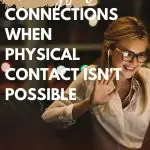In trying times such as these, it is more important than ever to focus upon the things that truly matter in life.
Aside from food, water, and shelter, connection with others is something which human beings need to thrive.
Alas, there are times, such as now, when physical contact isn't possible.
So how do you stay emotionally, mentally, and spiritually nourished during this time?
The answer is through forging meaningful connections.
Sometimes referred to as bonds, these essential connections can include a significant other or spouse, family, friends, and even work colleagues.
It is also worth noting that similar to so much in life, the quality of the connection is far more important than the quantity.
Some people may have meaningful connections with one or two others but maybe more fulfilled than those with 10 or more.
How to create a meaningful connection is essential in trying times.
Luckily for us, the 21st century gives us the advantage of technology such as video calls and voice chats, though this isn't an instant guarantee of success, because the fact of the matter is; meaningful connections take time and effort.
So, how do you have a meaningful connection remotely, and why are connections so beneficial?
Keep reading to find out more!
The Benefits of Meaningful Connections
Meaningful connections bring so many benefits to us. They can increase our sense of self-worth and self-esteem as well as an increase in our confidence.
When we have close bonds with others, we also feel more secure due to our prehistoric mindset of ‘safety in numbers'.
A meaningful connection can even improve our health!
This is why some couples stay happy and healthy into old age.
Doctors aren't sure why this happens, but there has been the supposition of ‘health behavior concordance' which is where when one partner is healthy, the other is too, and visa versa.
On a similar vein, those with meaningful connections throughout their lives have been found to live longer.
The chances of substance abuse were also found to be greatly reduced, as was blood pressure.
Our mental health can also benefit from strong connections with others.
Feelings of isolation can cause anxiety and depression, but when a friend, family member, or significant other offering a meaningful connection both to themselves and the outside world, feelings of emptiness or loneliness can be completely circumvented.
How Meaningful Connections Form

There are a variety of ways in which meaningful connections are created.
Sometimes they form organically over time and shared life experience, such as with a childhood friend.
Others occur because of the pre-existing connection of others such as within a family. One thing's certain however, all connections take effort and work.
Let's backtrack a little for a moment.
You may be thinking of your best friend who you've known since childhood and be saying to the screen ‘we never had to work for our friendship', however, you almost certainly did, you just didn't realize it!
Think back to times when you argued, or times when life got in the way, and you both had to take steps to reconnect, or even when your best friend got into a new hobby that you hated but pretended to like so you could hang out?
All these examples and many more show the efforts you have taken to form a meaningful connection with your bestie.
The Role of Physical Contact in Creating Meaningful Connections
Like lions or wolves, humans are pack animals. We're not meant to operate alone.
This loneliness can have big impacts on our physical and mental health.
A large part of the way that human beings connect is through physical contact.
Touch can make an interaction meaningful in a variety of ways such as; forming an introduction, showing approval or encouragement, sharing an emotion, or empathizing with another.
While the physical contact in question may only be a momentary pat on the back or a high five it can have long-lasting positive effects upon us.
Touch can reduce pain, release happy chemicals like serotonin into our brains, or form the love hormone dopamine.
How to have Meaningful Connections with Others when Physical Contact Isn't Possible

So, in times when you can't physically interact with others, how can you have the meaningful connections that are so essential to your health and well being?
Be an Active Listener
We can all listen passively; in fact, we do it all the time.
From nagging mothers to the friend that loves repeating themselves, we can all switch off and simply wait for them to stop talking.
Active listening, however, involves remaining present in the conversation and taking in what the other person says.
You can practice active listening in a variety of ways.
Responding is the easiest way to listen actively.
We all have that friend who will respond to your lengthy tale with a one-word answer like ‘cool' or ‘yeah', and this is infuriating because it shows they weren't actively listening to what you had to say.
A successful and meaningful conversation powered by active listening will look like this:
- You ask an open-ended question (this means a question that cannot be answered by ‘yes' or ‘no')
- You listen to the response (try not to butt in, but when solely relying on phone contact you can make some simple responses like ‘oh awesome!' or ‘yikes' to show you're still there)
- Follow up with a statement of your own that shows you've retained the information. (it's best if this statement is open-ended too, but it shouldn't be another question)
Create an Emotional Connection
There are times when connecting on a logical level is suitable, such as during work phone calls or when planning an event.
While practical, this type of conversation is tailored to the task at hand, and not the two (or more) people who are interacting.
A more meaningful conversation can occur when we connect on an emotional level.
This does require some vulnerability on your part but is worth it in the end.
When speaking, aim to push through the veil of the matter-of-fact and see the emotions behind the statements made.
A good way to do this is to reflect back on times you were in a similar situation, and think of how you felt at that time.
To give an example, a friend is calling you because a beloved pet has died.
You may have never owned a pet yourself, but can reflect upon when you lost a loved one or even something which meant a lot to you.
Making this type of emotional connection will allow you to show empathy.
Empathy is known to be one of the most genuine and resonating forms of connection that you can make with another.
It shows you're together on the same level and united in your feelings.
Empathy is a powerful tool that can build up a friend in a meaningful way, show solidarity, or even help with emotional healing.
Put simply, a lot of meaningful interactions involve empathic communication.
Focus on the Other Person
Ever not been able to get a word in edgeways?
It's frustrating, annoying, makes the conversation boring, and makes you feel like you matter less than the other person.
This is often more of an issue when interacting over a distance such as on the phone, as the other person cannot use their body language to help insert themselves into a conversation.
Oftentimes instead, phone conversations involve one passive party and one active party, when the best, most scintillating and stimulating conversations involve two active parties.
Phone conversations make it easy to slip into a passive or active role, which is why you should always keep the person at the end of the line in mind, and make sure you don't become the sole focus of the conversation.
Doing this is easy. All it takes is asking simple questions.
Questions give the person your talking to a chance to shine in the conversation, and a way to express their thoughts and opinions.
Questions show that you care what they have to say, and are willing to listen to them.
Know that there are Different Types of Intimacy

When you hear the word ‘intimacy' you may think we're solely talking about the interactions between couples, but this isn't the case.
Intimacy can be a fantastic way of creating a strong bond with a friend, family member, even sometimes a colleague!
What makes the difference between the intimacy between lovers and friends is the type that you express.
Physical intimacy may be the first type that comes to mind, but there are actually four others which can be used to forge close connections, even when you cannot meet up physically.
The other types of intimacy are just as important as physical intimacy, and are as follows:
- Emotional Intimacy: Creating an emotional connection which we talked about earlier in this article is one part of emotional intimacy. Emotional intimacy is also what occurs when we confide in others, such as sharing our worries, fears, or even secrets. Emotional intimacy requires you to let your guard down and places great trust in the other individual.
- Intellectual Intimacy: Do you have a best friend who you always seem to be on the same page with? Does someone simply ‘get' the way you think? Chances are you're intellectually intimate with them. Intellectual intimacy tends to naturally build as you get to know a person, and often revolves around having things in common such as a hobby or philosophical outlook on life.
- Experiential Intimacy: Often times we bond through experience. The closeness you might feel with a friend that has been there through thick and thin is likely, in part, down to experiential intimacy. Put simply, you've shared some life experiences and grown closer through them. In times when you're needing to connect, chat about some previous adventures (or misadventures!) can be a great way to connect meaningfully.
- Spiritual Intimacy: Connections made through sharing the same spiritual beliefs can be powerful. This doesn't have to apply to religious beliefs, however, and instead can involve a shared value such as generosity. It can also apply to those who feel they are soul mates.
Meaningful Communications
Some forms of communication can be much more meaningful than others.
Talking each day on social media or over e-mail is great, but takes little effort, meaning they can often be used as convenient options.
If you want to show you care and strengthen your bond with someone in times of separation, try calling them, writing them a letter, or sending them a care package.
These methods of contact take time and show your friend/family member that they're worth putting your day on hold just to speak to.
Treat it like it was a physical meet up.
We can often view non-physical meetups as different from physical hangouts.
However, both should be treated the same way.
For example, if you'd agreed to meet a friend at a restaurant, and you'd booked your table, and were sat there waiting only for them not to show, you'd be pretty upset.
Bailing on a pre-planned phone call or video call can feel exactly the same way.
Your friend may have had to put other things on hold or take steps to make themselves available in a similar way as getting read for a physical meet up.
Meaningful Connections Are Still Perfectly Possible!
So there you have it, yes, you can have meaningful and deep connections in times when you cannot connect physically.
While physical interactions are the easiest and most straightforward way to connect to someone else, intensely deep and meaningful conversations and interactions can be had on the phone, through video call, email, social media, and letter – it just takes a little more thought and effort to make it happen.
The best part is, you can start connecting with distant friends and family members any time, and I say no time like the present!
Make time in your day to drop your loved ones a line, see how they're doing.
You'll likely feel much better for doing so!
Alan is the founder of Subconscious Servant. He has a passion for learning about topics such as spirituality and the metaphysical world. The thing he loves to explore most though is manifesting with the law of attraction ✨.


